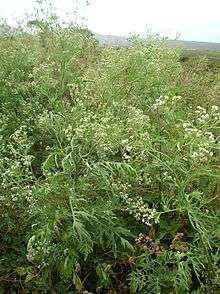Parthenium
Parthenium is a genus of North American shrubs in the sunflower tribe within the daisy family.[4][3]
| Feverfew Guayule | |
|---|---|
 | |
| Parthenium hysterophorus | |
| Scientific classification | |
| Kingdom: | |
| (unranked): | |
| (unranked): | |
| (unranked): | |
| Order: | |
| Family: | |
| Subfamily: | |
| Tribe: | |
| Genus: | Parthenium |
| Type species | |
| Parthenium hysterophorus[2][3] | |
| Synonyms[1] | |
| |
The name Parthenium is derived from either the Greek word παρθένος (parthenos), meaning "virgin," or παρθένιον (parthenion), an ancient name for a plant.[5]
Parthenium or Gajar Ghans is the most common invasive species in India. Parthenium hysterophorus plant causes milk disease in livestock and also responsible for respiratory malfunction in humans.
Members of the genus are commonly known as feverfew.[6] Notable species include guayule (P. argentatum) which has been used as a rubber substitute, especially during the Second World War;[7] and also P. hysterophorus, a serious invasive species in the Old World.[8]
- Species[1]
- Parthenium alpinum (Nutt.) Torr. & A.Gray – Arkansas River feverfew - NM CO WY
- Parthenium argentatum A.Gray – Guayule - TX, Coahuila, Guanajuato, Nuevo León, San Luis Potosí, Zacatecas
- Parthenium cineraceum Rollins - Bolivia, Paraguay
- Parthenium confertum A.Gray – Gray's feverfew - AZ NM TX Chihuahua, Coahuila, Nuevo León, San Luis Potosí, Querétaro, Tamaulipas
- Parthenium fruticosum Less. - from Tamaulipas to Chiapas
- Parthenium hysterophorus L. – Santa Maria feverfew, whitetop weed - widespread in North + South America
- Parthenium incanum Kunth – mariola - NV UT AZ NM TX Chihuahua, Coahuila, Durango, Hidalgo, Nuevo León, San Luis Potosí, Zacatecas
- Parthenium integrifolium L. – American feverfew, wild quinine - from TX to MA + MN
- Parthenium ligulatum (M.E. Jones) Barneby – Colorado feverfew - CO UT
- Parthenium rollinsianum Rzed. - San Luis Potosí
- Parthenium schottii Greenm. ex Millsp. & Chase - Yucatán
- Parthenium tomentosum DC. - Oaxaca, Puebla
- Congress grass
- Warning - Invasive Plant https://www.daf.qld.gov.au/__data/assets/pdf_file/0004/68602/IPA-Parthenium-PP2.pdf
Uses
In North America, the Jicarilla Apache people used Parthenium incanum for medicine (Opler 1946: 8). The sap of guayule (P. argentatum)
Gallery
.jpg)

- Wild quinine (Parthenium integrifolium)
References
- Flann, C (ed) 2009+ Global Compositae Checklist Archived 2014-12-27 at Archive.today
- lectotype designated by N.L. Britton & A. Brown, Ill. fl. n. U.S., ed. 2. 3: 464 (1913)
- Tropicos, Parthenium L.
- Linnaeus, Carl von. 1753. Species Plantarum 2: 988 in Latin
- Strother, John L. "Parthenium Linnaeus, Sp. Pl. 2: 988. 1753; Gen. Pl. ed. 5, 426. 1754". Flora of North America. eFloras.org. Retrieved 2011-08-09.
- "Parthenium". Integrated Taxonomic Information System. Retrieved 2011-08-09.
- Ray, D.T. 1993. Guayule: A source of natural rubber. p. 338-343. In: J. Janick and J.E. Simon (eds.), New crops. Wiley, New York.
- "Parthenium hysterophorus (herb)". Global Invasive Species Database. Invasive Species Specialist Group. 2010-10-04. Retrieved 2011-08-09.
- Everitt, J.H.; Lonard, R.L.; Little, C.R. (2007). Weeds in South Texas and Northern Mexico. Lubbock: Texas Tech University Press. ISBN 0-89672-614-2
- Opler, Morris E. (1946). Childhood and youth in Jicarilla Apache society. Publications of the Frederick Webb Hodge Anniversary Fund (Vol. 5). Los Angeles: The Southwest Museum Administrator of the Fund.
| Wikimedia Commons has media related to Parthenium. |
| Wikispecies has information related to Parthenium |